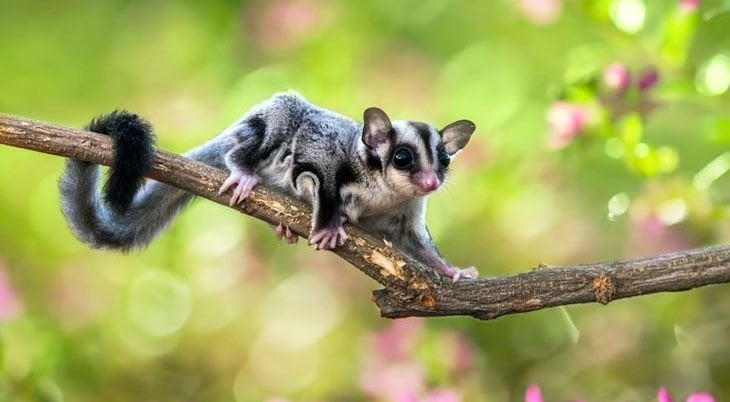
Thinking of getting a sugar glider? These tiny marsupials are energetic and friendly, making them popular choices as pets. Though they weigh less than a half-pound, they're more closely related to kangaroos than they are flying squirrels. If you think a sugar glider would make an ideal pet for your family, here's what our veterinary team would like you to know before making your decision.
Sugar Glider Health
These pets are nocturnal. This means they're awake and active during the night-time hours. Sugar gliders are not the best choice of pet for owners who work night jobs or retire early. To be happy and healthy, they need plenty of interaction with their human. This means taking them out of their cage and allowing them to play and explore in pet-proof spaces. It's important to keep a close eye on your pet's diet, too, as sugar gliders in captivity may easily become obese due to too little exercise and too much fruit.
Sugar Glider Care
The most important thing a sugar glider needs is a friend. These pets are highly social and won't thrive in isolation. This means, if you keep one sugar glider, you must keep two. But a sugar glider needs other things as well, including:
- A big, roomy cage to leap, jump, and glide
- A secure lock that keeps it from escaping
- Branches or shelves to climb on
- A cozy pouch to sleep in
- Clean bedding
- Toys such as bird swings or hamster wheels
Aside from housing and accessories, these cute little creatures need a specialized diet to keep them healthy and happy. Your veterinarian can help you choose the best diet for captive sugar gliders.
Feeding Your Sugar Gliders
In the wild, sugar gliders are omnivorous, meaning they eat both plants and animals. Gliders in captivity should be fed a somewhat complicated diet that includes:
- Protein -- cooked eggs, crickets, mealworms
- Fruit and green leafy vegetables
- Pelleted food containing nectar
- Vitamin and mineral supplements
Our veterinary team will be happy to advise you regarding the care and treatment of your sugar gliders.
Training a Sugar Glider
Sugar gliders can be potty-trained to go in their cage and learn to come when you call them. If you give them lots of love and patience and reward good behavior with tasty treats, they'll be quite well-behaved.


